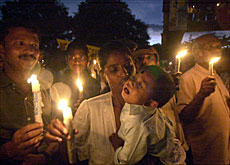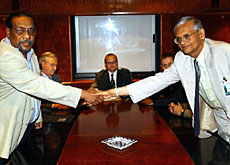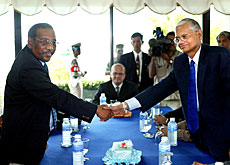Swiss help Sri Lanka keep the peace

Sri Lankan officials are currently on a visit to Switzerland to look at the Swiss federal system as a possible model for rebuilding their country.
Bern has been stepping up its efforts to help the Sri Lankan government and the separatist Tamil Tiger rebels strike a peace deal after 19 years of civil war.
Despite agreeing to a ceasefire agreement in February 2002, tensions in the region are still running high.
Earlier this week the Sri Lankan navy sank a Tamil Tiger ship suspected of smuggling weapons, killing 11 people on board. The incident is expected to have a negative impact on next week’s peace talks in Japan.
Ahead of the latest round of negotiations, Swiss government officials have been holding talks with officials from both sides.
They have been examining federal models that would satisfy the demands of the Tamil Tigers for an autonomous homeland in the northeast of the country.
Talks have been held both in Switzerland and in Sri Lanka.
“These visits are primarily about us getting to know one another, which is important for us if we want to play in a role in the country,” Markus Heiniger, who heads up the Sri Lankan division at the Swiss foreign ministry, told swissinfo.
Swiss example
Heiniger explained that while Swiss federalism could not be directly superimposed on Sri Lanka, many aspects of Swiss government are very pertinent to the island.
“Swiss federalism was built from below whereas Sri Lanka faces the task of decentralising the country,” he says. “But it’s very useful for them to see the functioning of our government and it shows them that this system can function.”
Heiniger says Sri Lankan delegates are particularly keen to know more about how federalism can be applied in the fields of finance, defence and weapons.
The integration of different ethnic and cultural minorities within a federal government had also been a topic of discussion, he said.
“We’re bringing in representatives from the Italian and Romansh parts of Switzerland and from different cantons and communities into the discussions,” added Heiniger.
Chance for peace
Heiniger, who has just returned from four months in Sri Lanka, says the chances for peace look better than ever but are still fragile.
“On one hand it’s fantastic to have a one-year ceasefire, because that hasn’t happened in 20 years,” he said. “But there’s a very long way ahead for the parties, and the questions which they have to negotiate are very complex.”
Heiniger says it’s vital that Switzerland and other countries continue to be involved in peace projects, particularly those that aid local communities.
“It’s important that we target civil society, both on the Tamil and on the Singhalese side, and get them more involved in peace initiatives.”
De-mining
As part of its activities, Switzerland is also supporting de-mining activities in the north of the country.
“Hundreds of thousands of people fled the region because of the mines, and the fact that they are now able to go home means that they are more likely to support the peace process,” revealed Heiniger.
Switzerland is also heavily involved in improving living conditions in the poorest areas.
“It’s a catch-22 situation. On one hand you have to improve living conditions to get the peace process moving, but to do that you need more progress in peace talks.”
swissinfo, Hansjörg Bolliger and Vanessa Mock
The 19-year civil war has claimed 65,000 lives.
The Sri Lankan government and Tamil Tiger seperatists – who have been fighting for an independent homeland – signed a ceasefire in February 2002.
They formally agreed to share power under a federal system in December 2002.
The two sides are due to hold peacetalks in Japan next week.

In compliance with the JTI standards
More: SWI swissinfo.ch certified by the Journalism Trust Initiative










You can find an overview of ongoing debates with our journalists here . Please join us!
If you want to start a conversation about a topic raised in this article or want to report factual errors, email us at english@swissinfo.ch.